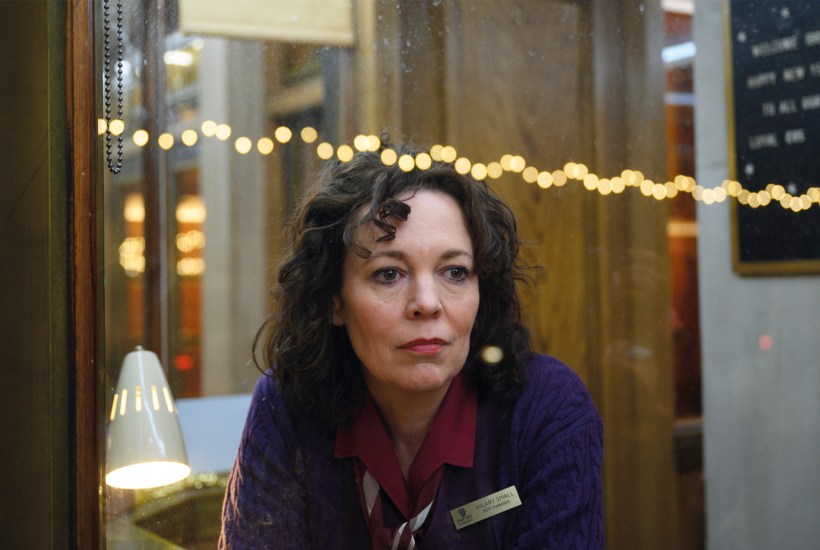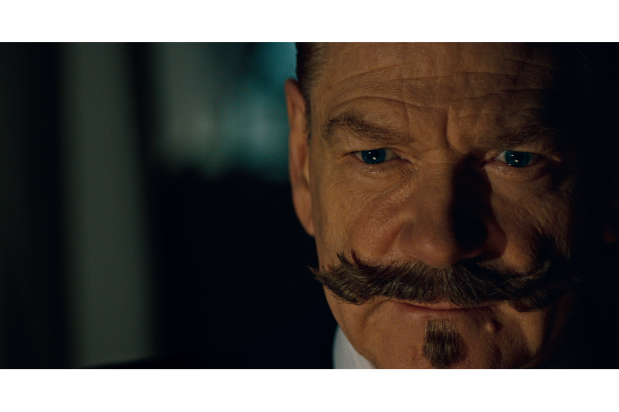Sam Mendes’s Empire of Light, which he wrote as well as directed, is billed as a ‘love letter to cinema’ although, alas, in this instance cinema does not appear to love him back. The magic of film-going is the theme but there is almost no film-going in it and what there is isn’t magic. Peculiarly soulless, pedestrian and plodding, it is, however, wonderfully shot by Roger Deakins. It also stars Olivia Colman so now we can deal with that all-important question: can Olivia Colman save any film she’s in? No, is the answer. But it is probably a hundred times better than it would have been without her.
The movie is set in the early 1980s in a magnificent but fading art-deco cinema, the Empire, situated in a British seaside town that isn’t specified but is Margate, I think. There’s a close-up of the inscription above the entrance – ‘Find where light in darkness lies’ – just in case there was any doubt where this was wanting to go. The cinema’s deputy manager is Hilary (Colman), who is dedicated to her job, and well-liked, but sad and lonely because older, single women in film are always sad and lonely. We watch her eat Christmas dinner on her own, as is the older, single woman’s fate. The Empire’s other staff include Mr Ellis (Colin Firth), the manager, Norman (Toby Jones), the projectionist, and Janine and Neil who are so thinly written I can’t be bothered to look up who plays them. (Apologies.)
There’s a new employee, a young fella, Stephen (Micheal Ward), of Caribbean heritage, who strikes up a relationship with Hilary, and wants to be an architect. ‘No one will give you the life you want, Stephen,’ Hilary will tell him. ‘You have to go out and get it.’ Elsewhere, during a sexual liaison, we get: ‘Your arse feels so good in my hands.’ This is Mendes’s first project as solo writer and I’m not saying he should be banned from the keyboard but maybe friends and family could be tactfully discouraging?
Many personal obstacles are thrown at Stephen and Hilary. It becomes apparent that Hilary had previously suffered a breakdown and been hospitalised, so that’s one strand. But also it’s Thatcher’s Britain and there’s the National Front and racism and there is childhood trauma and there is protesting against the patriarchy. In ticking off all the social ills off the time, I was most put in mind of an episode of Call the Midwife, which probably isn’t what you want when your intention had been ‘a love letter to cinema’. Meanwhile, two of the Empire’s screens have closed leaving the upper floor derelict. Stephen and Hilary find a pigeon there, with a broken wing, which Stephen manages to treat by wrapping it in a sock, and the pigeon is healed and flies free! (Do the RSPB know about this sock treatment?)
What this film isn’t about, regrettably, is film or how the power of film can find light where darkness lies and compensate for a difficult life. Aside from Norman, who delivers mini-lectures on the art of projection, no character is interested in film, sees any films (apart from Hilary, right at the end; Being There), or talks about films. This could just as easily have been set in a butcher’s shop.
The film is no Cinema Paradiso, in other words. But it is gorgeous to look at and while Colman can’t do much with Hilary, who is also underwritten, her presence is most welcome. Mendes has, of course, directed some spectacular films (American Beauty, Revolutionary Road, Spectre) and co-wrote as well as directed 1917, so I think we all know what happened here. And, henceforth, tactful discouragement is key.
Got something to add? Join the discussion and comment below.
Get 10 issues for just $10
Subscribe to The Spectator Australia today for the next 10 magazine issues, plus full online access, for just $10.
You might disagree with half of it, but you’ll enjoy reading all of it. Try your first month for free, then just $2 a week for the remainder of your first year.














Comments
Don't miss out
Join the conversation with other Spectator Australia readers. Subscribe to leave a comment.
SUBSCRIBEAlready a subscriber? Log in